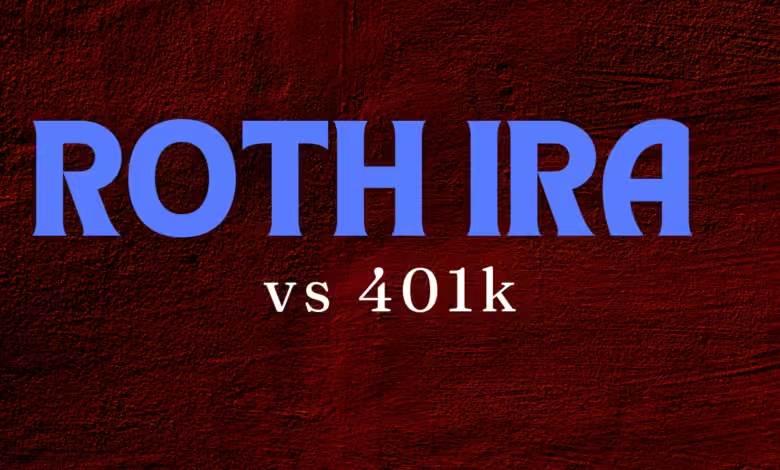Roth IRA vs. 401k: Key Differences Which One is Better to Put Money

When planning for retirement, of the most popular savings options within the U.S. Are the Roth IRA and the 401(k). Both have their advantages, but finding out which one is proper for you can be perplexing. Should you placed your cash in a 401(k), or is a Roth IRA a better alternative? Let’s dive into the details and help you understand the Roth IRA vs. 401k differences, benefits, and potential downsides of each to make an informed decision.
What is a Roth IRA?
A Roth IRA (Individual Retirement Account) is a retirement savings account that lets in your money to develop tax-loose. You make contributions after-tax greenbacks to a Roth IRA, and your investment grows without any tax legal responsibility. The most attractive feature? You may not pay taxes on your withdrawals in retirement, as long as you meet sure criteria.
Key Features of a Roth IRA
- Tax-Free Withdrawals: Since you contribute money that’s already been taxed, withdrawals in retirement are tax-loose.
- Flexible Withdrawal Rules: You can withdraw your contributions (however now not the earnings) at any time without penalties.
- No Required Minimum Distributions (RMDs): Unlike different retirement accounts, Roth IRAs don’t have RMDs, so that you aren’t required to start retreating at a positive age.
- Contribution Limits: For 2024, the once a year contribution restrict for individuals under 50 is $6,500, and for the ones 50 or older, it’s $7,500.
What is a 401(k)?
A 401(k) is an enterprise-backed retirement plan that lets in employees to shop and make investments for his or her retirement on a tax-deferred foundation. Contributions are made with pre-tax greenbacks, decreasing your taxable income for the year. The cash grows tax-deferred, however you’ll pay taxes whilst you withdraw it in retirement.
Key Features of a 401(k)
- Pre-Tax Contributions: Contributions lessen your taxable earnings, reducing your tax invoice for the year.
- Employer Match: Many employers offer an identical contribution, which is basically free money to your retirement savings.
- Higher Contribution Limits: For 2024, the contribution limit is $22,500, or $30,000 for those aged 50 and over.
- Required Minimum Distributions (RMDs): You must begin taking withdrawals at age seventy three (as of present day guidelines).
Roth IRA vs. 401k: Key Differences
1.Tax Treatment
Roth IRA: Pay taxes now, revel in tax-unfastened withdrawals later.
401(k): Contributions are tax-deferred, meaning you pay taxes on withdrawals in retirement.
2.Contribution Limits
Roth IRA: Lower contribution limits ($6,500 or $7,500 for those 50 and older).
401(k): Higher contribution limits ($22,500 or $30,000 for the ones 50 and older).
3.Employer Match
Roth IRA: No agency contributions.
401(k): Often includes company matching, that could considerably growth your savings.
4.Required Minimum Distributions (RMDs)
Roth IRA: No RMDs; your money can develop so long as you need.
401(k): RMDs begin at age seventy three.
5.Flexibility of Withdrawals
Roth IRA: You can withdraw contributions (not earnings) at any time without consequences.
401(k): Withdrawals before age 59½ normally incur a penalty, plus taxes.
Is It Better to Put Money in a 401(k) or Roth IRA?
The answer depends on your financial situation, tax bracket, and retirement goals. Here are some scenarios to help you decide:
When a Roth IRA Might Be Better:
- You Expect to Be in a Higher Tax Bracket in Retirement: Since Roth IRA withdrawals are tax-free, if you think you’ll pay higher taxes in retirement, it might make sense to pay taxes now rather than later.
- You Want Flexibility: With no RMDs, Roth IRAs allow you to leave your money to grow tax-free for as long as you want. You also have the flexibility to withdraw contributions at any time without penalties.
- You Prefer Tax-Free Income in Retirement: Knowing you won’t have to pay taxes on withdrawals can give you peace of mind and help with financial planning.
When a 401(k) Might Be Better:
- You Get an Employer Match: If your employer offers a match, it’s like getting free money. Contribute enough to get the full match before considering other retirement savings options.
- You Are in a High Tax Bracket Now: If you are in a high tax bracket today, a 401(k) allows you to reduce your taxable income and save on taxes in the short term.
- You Need Higher Contribution Limits: A 401(k) allows for significantly higher contributions than a Roth IRA, which is advantageous if you aim to save aggressively for retirement.
Why Is the Roth IRA Better?
For many, a Roth IRA can be a better choice due to its tax-free growth, flexibility, and lack of required minimum distributions. Here are some reasons why:
- Tax-Free Withdrawals in Retirement: Your withdrawals are 100% tax-free in retirement, which can be a massive advantage if you expect to be in a higher tax bracket.
- No RMDs: You aren’t forced to start withdrawing money at a certain age, which means your savings can continue growing tax-free for as long as you want.
- Flexibility for Emergencies: You can withdraw your contributions at any time without penalties, providing a level of liquidity that other retirement accounts do not offer.
- Estate Planning Benefits: Roth IRAs can be passed on to heirs tax-free, making them a strategic tool for estate planning.
Conclusion: Making the Right Choice for Your Retirement
Ultimately, the decision between a Roth IRA and a 401(k) depends on your individual financial situation, retirement goals, and tax considerations. If your employer offers a match, take advantage of the 401(k) first. Then, consider contributing to a Roth IRA for the flexibility, tax-free growth, and retirement income it offers. For many people, a combination of both accounts provides the best of both worlds.




